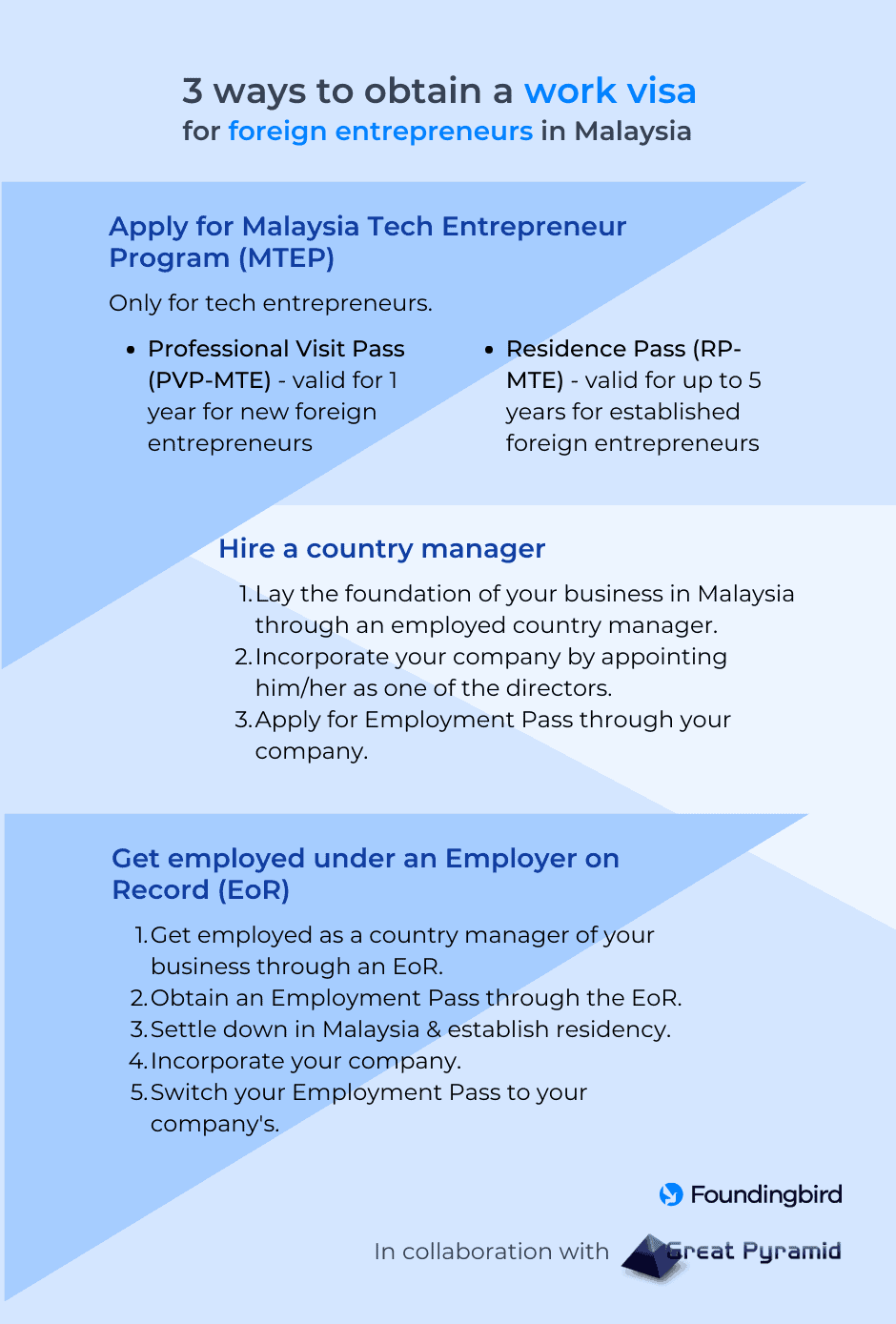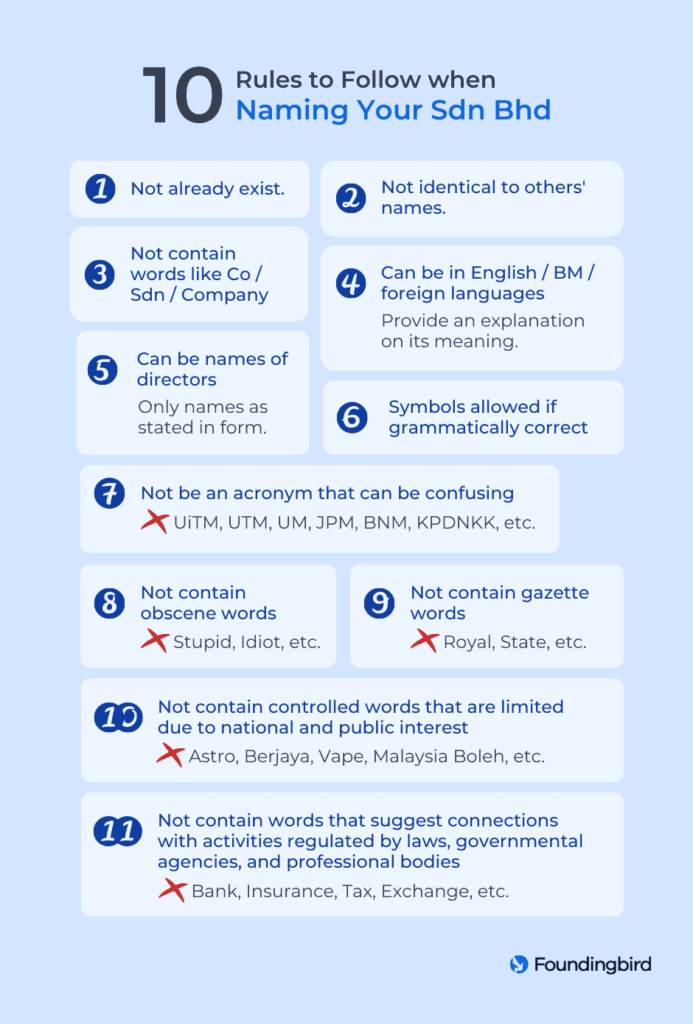How to obtain a work visa in Malaysia for foreign entrepreneurs
Starting a company in Malaysia as a foreigner is not as straightforward as it is for Malaysians because one important criterion for directors in private limited companies is for them to be residing in the country. While you can incorporate your company online, you are required to provide proof of residence in Malaysia to be eligible as a director for your company. Since you are only able to obtain a work visa through your company, in theory, this creates an endless cycle of not being able to obtain a visa due to not being able to incorporate your company. There are 3 ways you can go about obtaining a visa; thus allowing you to run your business in Malaysia as a foreigner.
Apply for Malaysia Tech Entrepreneur Program (MTEP)
In 2017, MDEC introduced the MTEP together with Malaysia Digital Hub (MDH) with the mission to facilitate the country's tech startup ecosystem by providing work visas for foreign tech entrepreneurs who want to establish businesses in the ASEAN market from Malaysia. There are two types of work visas under this program — Professional Visit Pass (PVP-MTE) which is valid for 1 year, and Residence Pass (RP-MTE), which is valid for up to 5 years for new foreign entrepreneurs and established foreign entrepreneurs respectively. This is the only program that provides you with a visa before incorporating a company. However, it only applies to entrepreneurs who run tech businesses.
Eligibility of new foreign entrepreneurs for MTEP application
- Is non-Malaysian with no criminal record in their residing country.
- Is self-employed with an innovative digital business idea and a strong digital proposition.
- Has a minimum amount of RM50,000 in their personal bank account for at least 3 months before the application.
- Has a recognised sponsoring organisation registered under MDH or MaGIC who is able to vouch for your presence in Malaysia and also be responsible for your stay, maintenance and repatriation while you reside in Malaysia. MDEC shall be your sponsoring organisation if you are not able to find one.
- Has signed up with one of the MDHs (It is wise to check with the MDHs if they can refund the tenancy payment in case the work visa application is rejected).
Eligibility of established foreign entrepreneurs for MTEP application
- Is non-Malaysian with no criminal record in their residing country.
- Is self-employed with a strong digital proposition and a proven track record (more than 3 years established with the latest 2-year financial records).
- Has a minimum amount of RM50,000 in their personal bank account.
- Has proof of business performance.
- Has a Malaysian individual above the age of 21 years old as your sponsor who is able to vouch for your presence in Malaysia and also be responsible for your stay, maintenance and repatriation while you reside in Malaysia.
- (for venture capital) Founder, co-founder, or the Malaysian Venture Partner with minimum funds of RM10mil and registered as a Venture Capital Management Corporations (VCMC) with Securities Commission Malaysia.
Hire a country manager
If you are running an existing business in your home country and do not have plans to relocate to Malaysia immediately, you can employ a country manager in Malaysia through an Employer on Record (EoR) to lay the foundation before you officially expand your business to Malaysia. Once trust is established between you and the country manager, you can incorporate your company by appointing the country manager as one of the directors. To ensure more flexibility in the company's governance, you can adopt a constitution and state that signatures from a majority of directors can pass a board resolution without the signatures of all directors.
Once you're ready to apply for a visa which would allow you to enter Malaysia under the Employment Pass, you are required to inject a minimum amount of paid-up capital in order for your company to be eligible to apply for a work visa for you. There are 2 types of visas for foreigners, Employment Pass (Category II) Expatriate, which is valid for 2 years, and Employment Pass (Category I) Expatriate, which is valid for 5 years.
Minimum paid-up capital requirement of your company for Employment Pass application
- RM350,000 for a joint venture with minimum foreign equity of 30%.
- RM500,000 for a 100% foreign-owned company.
- RM1,000,000 for a foreign-owned company (foreign equity at 51% and above) operating in the Wholesale and Retail Trade (WRT) sector or involved in the subsectors on non-regulated services.
Your eligibility for Employment Pass application
- Has a basic monthly salary between RM5,000 and RM9,999 for Employment Pass (Category II) or more than RM10,000 for Employment Pass (Category I).
- Has an employment contract up to 2 years for Employment Pass (Category II) or up to 5 years for Employment Pass (Category I).
- Has minimum equity of 30% in the company.
- Must be a company director or hold a key position in the company.
Get employed under an Employer on Record (EoR)
In order to establish your residency in Malaysia so that you are eligible to incorporate a company here, you can get in touch with a EoR to get employed as a country manager of your business. The EoR will apply for an employment pass for you to work under their company. Once you have settled down in Malaysia, you can incorporate a company as a director since you have fulfilled the requirement of residing in the country.
After running the company for several months and having proved that your company has good financial records, your company can apply for an Employment Pass as an employer for you. As mentioned above, there is a minimum paid-up capital requirement to meet and you are required to be employed under your own company. When your application is approved, you can switch your visa from the EoR over to your own company's visa.

It is not recommended to appoint a nominee director who has no stake in your business just to set up a company in Malaysia for the following reason — according to the Companies Commission of Malaysia (SSM)'s regulations, a nominee director is no different compared to an actual director for your company. It can pose a risk to yourself and your business in any case of misconduct. Hence, it is advisable to find a trustworthy business partner who resides in Malaysia to start the company together if you are not able to relocate to this country.
Special thanks to Tejvinder from Great Pyramid for this content collaboration! Great Pyramid is a HR and immigration solutions provider based in Malaysia. They provide assistance to businesses as an Employer on Record (EoR) and also in staff recruitment, besides assisting in Employment Pass application.






